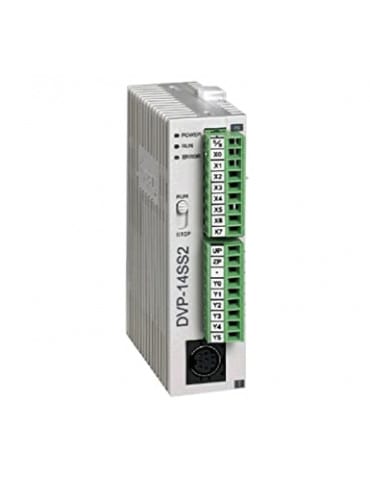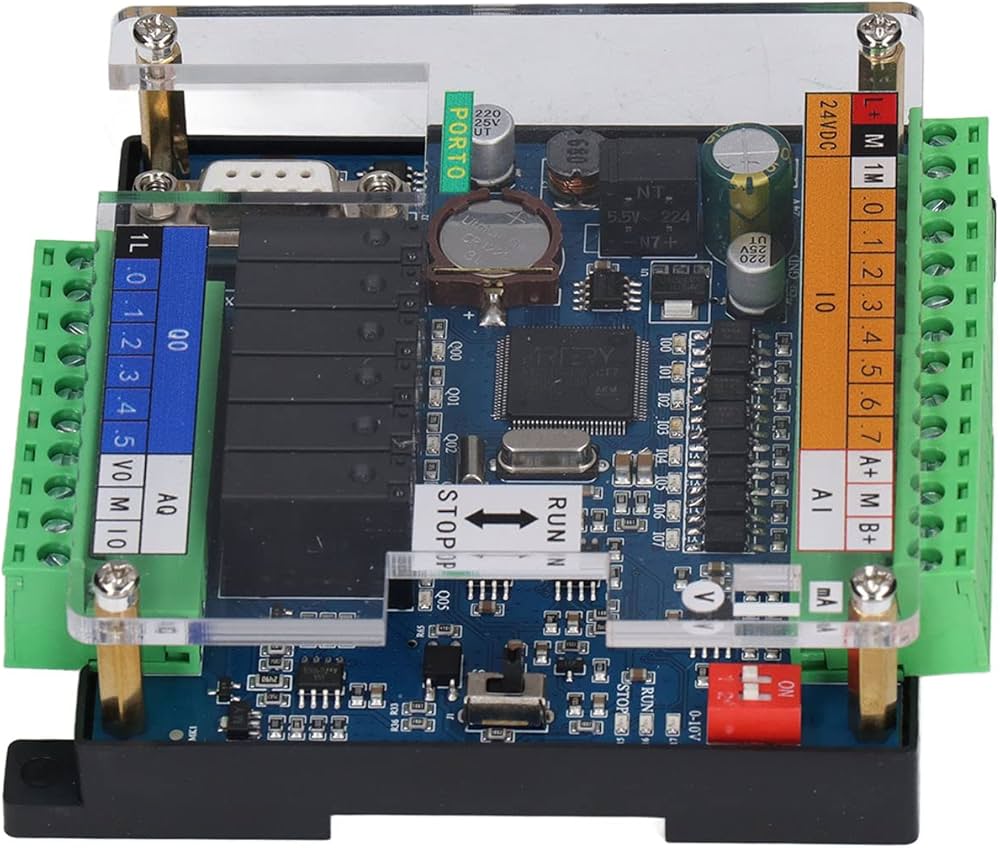Table des matières
ToggleUnderstanding Programmable Logic Controllers
Programmable logic controllers, or PLCs (Programmable Logic Controllers), are essential devices in the field of industrial automation. They enable the control and regulation of various equipment based on predefined programs. Their applications are vast, ranging from managing production systems to maintaining infrastructure.
A programmable logic controller mainly consists of a processor, memory modules, input and output (I/O), and various communication devices. These components work together to execute the instructions programmed by the user, typically through a specialized language such as ladder diagram or structured text.
The programming process of these devices involves several key steps:
- Needs definition: Identify the specific tasks the controller must perform.
- Coding: Use specific programming languages to define the instructions the controller must follow.
- Simulation: Test the program in a virtual environment to verify its operation.
- Implementation: Deploy the program on the controller and integrate it into the real system.
- Maintenance and optimization: Monitor and adjust the program according to the changing needs of the operation.
The flexibility of programmable logic controllers makes them indispensable in various industrial fields. They are used for predictive maintenance, allowing for forecasting and preventing failures through real-time data analysis. They also promote lean production, optimizing processes to reduce waste and maximize efficiency.
Technological advancements such as industrial IoT and smart contracts are opening new perspectives for programmable logic controllers. For instance, the integration of OPC-UA (Open Platform Communications Unified Architecture) allows for smoother and more secure communication between various equipment and systems.
Operating Principles
Programmable logic controllers, known by the acronym PLC (Programmable Logic Controller), are essential devices in the field of industrial automation. Used to control and monitor machines or production processes, these devices offer increased flexibility and precision, enabling industries to maximize their operational efficiency.
A programmable logic controller is an electronic system designed to manage industrial processes. It replaces relay-timer systems and is capable of performing logical, mathematical, and timing operations.
In a production environment, controllers can control functions as varied as starting and stopping machines, temperature control, conveyor management, and much more.
To effectively use a programmable logic controller, it is crucial to understand its
operational processes. Here’s a description of the main steps:
- Input: The PLC receives information from sensors and other input devices. This data may include information on temperature, pressure, position, etc.
- Processing: The PLC processes the received data according to the program it is executing. This program is often written in a programming language specific to the PLC, such as Ladder Logic.
- Output: After processing the input information, the PLC sends commands to actuators, such as motors or valves, to perform an action.
Programmable logic controllers are preferred for their robustness, their ability to operate in harsh industrial environments, and their flexibility to be reprogrammed according to production needs. By integrating modern technologies such as Internet of Things (IoT) and human-machine interfaces (HMI), controllers allow for real-time control and monitoring, fostering predictive maintenance and lean production.
Different Types of Controllers
Programmable logic controllers are essential electromechanical devices in many industrial sectors. They enable the control of machines, production processes, and various equipment within a factory. These systems reduce human error, increase efficiency, and ensure continuous production.
It is crucial to understand the operation and utility of programmable logic controllers to optimize industrial processes. By using a combination of hardware and software, controllers can monitor and command various aspects of an industrial process. These robust systems also enable predictive maintenance by collecting and analyzing real-time data.
Programmable logic controllers come in different forms tailored to the specific needs of each application. Here are some common types:
- Industrial programmable controllers (IPCs): Used primarily in manufacturing, they are involved in production control, inventory management, and the automation of repetitive tasks.
- Distributed controllers: Deployed across vast industrial sites to control and coordinate multiple remote devices while centralizing information.
- Embedded controllers: Incorporated directly into machines or vehicles, they ensure the control and supervision of moving systems.
These different categories of programmable logic controllers meet varied needs, whether for simple automation of repetitive tasks or complex management of processes distributed across large infrastructures. The key is to select the type of programmable logic controller that best suits the specific application to maximize gains in efficiency and productivity.
Applications of Programmable Logic Controllers

Programmable logic controllers are essential devices in modern industry. They enable the control and monitoring of industrial processes automatically, thereby increasing the efficiency and reliability of operations. These systems can be programmed to perform a variety of tasks, from simple machine controls to complex production processes.
The applications of programmable logic controllers are very diverse, ranging from material handling to quality inspection. Here are some areas where they are particularly useful:
- Production automation: Programmable logic controllers control assembly lines, ensuring rapid and reliable production.
- Chemical process control: They ensure the regulation and monitoring of chemical reactions, optimizing the quality of finished products.
- Energy management: Controllers are used to manage energy usage in industrial facilities, reducing costs and increasing energy efficiency.
- Transportation systems: They control internal transportation systems, such as conveyors and AGVs (Automated Guided Vehicles), facilitating material flow within factories.
One of the major advantages of programmable logic controllers is their ability to perform predictive maintenance. By monitoring operating conditions, they can identify signs of failure before they occur, enabling proactive maintenance planning.
Additionally, programmable logic controllers often integrate AI technologies and machine learning, allowing them to learn and adapt to changing conditions in the production environment. They thus become indispensable tools for companies looking to remain competitive in a constantly evolving market.
In conclusion, programmable logic controllers are key elements in optimizing industrial processes, offering flexible and scalable solutions that meet the varied needs of modern industries.
Industry and Manufacturing
A programmable logic controller is an electronic device designed to replace relay and fixed wiring control systems. It allows for greater flexibility and rapid adaptation to process changes. Programmable logic controllers are commonly used in many industrial sectors to improve efficiency and reduce operational costs.
The applications of programmable logic controllers are varied and cover a multitude of fields. They are essential for automating production lines, managing security systems, controlling machines, and energy management. Their programming is generally done using specific languages like Ladder, Grafcet, or structured text.
In the industry and manufacturing sector, programmable logic controllers play a crucial role. They enable the implementation of more efficient production systems due to their ability to manage complex processes in real-time. Here are some examples:
- Automation of assembly lines
- Control and monitoring of CNC machines
- Management and optimization of energy consumption
- Predictive maintenance of equipment
The use of programmable logic controllers also allows for the integration of emerging technologies such as IoT sensors and Industry 4.0 applications. This paves the way for smarter factories where processes are not only automated but also optimized for maximum performance.
Process Automation
A programmable logic controller, often referred to as an IPC (Industrial Programmable Controller), is a device used for the automation of industrial processes. These devices enable the control of machines or processes automatically through embedded computer programs. IPCs are essential in various sectors of modern industry to improve efficiency and precision of operations.
Among the applications of programmable logic controllers are the automatic adjustment of production lines, supervision of heating, ventilation, and air conditioning (HVAC) systems, and management of water and electricity networks. IPCs are also widely used in the automotive industry to assemble parts with great precision.
Regarding process automation, programmable logic controllers play a crucial role in monitoring and controlling industrial systems. They can be programmed to perform repetitive tasks, reduce human errors, and increase productivity. Additionally, they allow for predictive maintenance, alerting operators before a machine fails, thus ensuring continuity of production.
The main advantages of programmable logic controllers include:
- Operational efficiency: Reduction of downtime and human errors.
- Flexibility: Ease of reprogramming and adapting IPCs to meet needs.
- Reliability: Improvement of the quality and consistency of finished products.
By integrating programmable logic controllers into lean production systems, companies can optimize their processes, reduce operational costs, and improve product quality. Technological advancements such as smart contracts and OPC-UA also enhance the management of their supply chain by automating transactions and communications between machines.





